I turned my Chromebook into a Windows machine — and so can you | Laptop Mag
I turned my Chromebook into a Windows machine — so tin can you
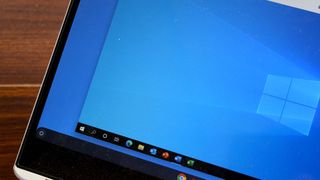
When I bought into Google's idea of a web browser equally an operating organisation one-half a decade ago, I didn't conceptualize I'd soon be running traditional Windows software on it. But that's exactly what I've been doing on my Chromebook these past two weeks.
I've ditched Google'southward online productivity suite for desktop versions of Microsoft Office. I'thousand browsing the web on Mozilla Firefox, not Google Chrome. I've been editing pictures on the PC client of Adobe Photoshop instead of Android apps. And dismissing those pesky Windows alerts now and then.
Windows 10 on Chrome OS
The fact that I tin even admission these apps is courtesy of a collaboration between Google and Parallels. The latter company builds virtualization software for computers to bring Windows apps support to Chrome Bone. Last calendar month, Parallels introduced a Chrome OS customer that allows yous to boot a full, no-compromise version of Windows 10 in a window on your Chromebook.
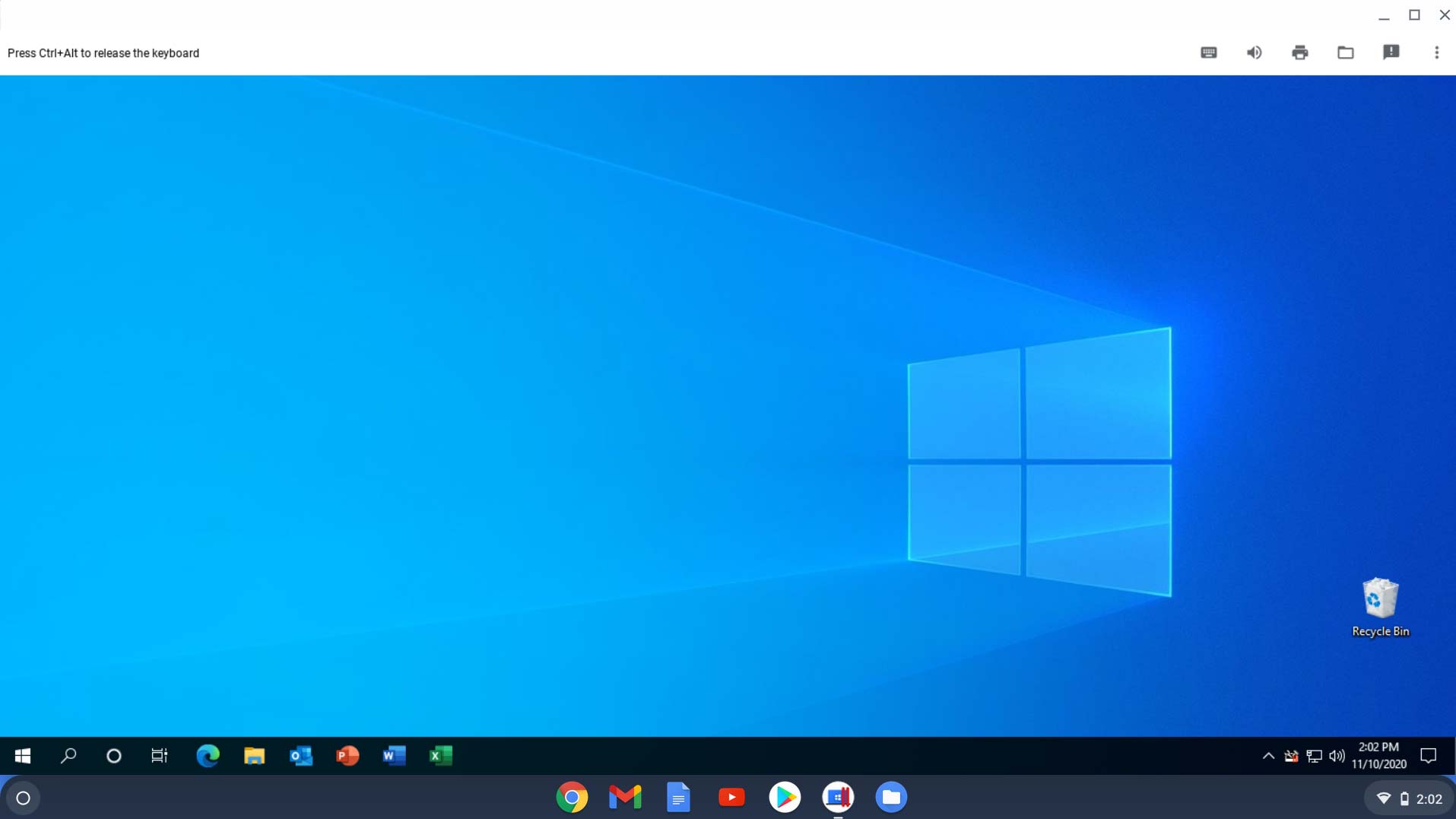
This means, in addition to Linux and Android apps, it's at present possible for you to run Windows apps on your Chromebook. Parallels is, at the moment, limited to enterprises but it's not the only 1 that has rolled out a Chrome OS analogue.
CodeWeavers, another developer that offers virtualization services, announced a defended Chrome OS client a few weeks ago. Unlike Parallels, which is restricted to concern customers and requires you lot to load the entire Windows operating system first, CodeWeavers' CrossOver is bachelor for everyone and lets yous directly launch and install Windows apps.
Both CodeWeavers and Parallels accept taken a markedly different arroyo to enable Windows compatibility on Chrome Bone. Just their announcements raise the same question: can Windows apps brand Chromebooks better computers?
Before we dive into that, information technology'due south critical to understand simply how well these Windows apps perform on Chrome Bone. The short answer: much ameliorate than you'd expect.
What'south it like using Windows apps on a Chromebook?
Parallels demands a high-end Chromebook with at to the lowest degree an Intel Core i5, 16GB of RAM, and a 128GB SSD since y'all're running another operating system within Chrome Os. Yet, even on my HP Chromebook 14, which has an Intel Core i3, 8GB RAM, and 64GB eMMC storage, Parallels was surprisingly responsive and functioned without any hiccups whatsoever.
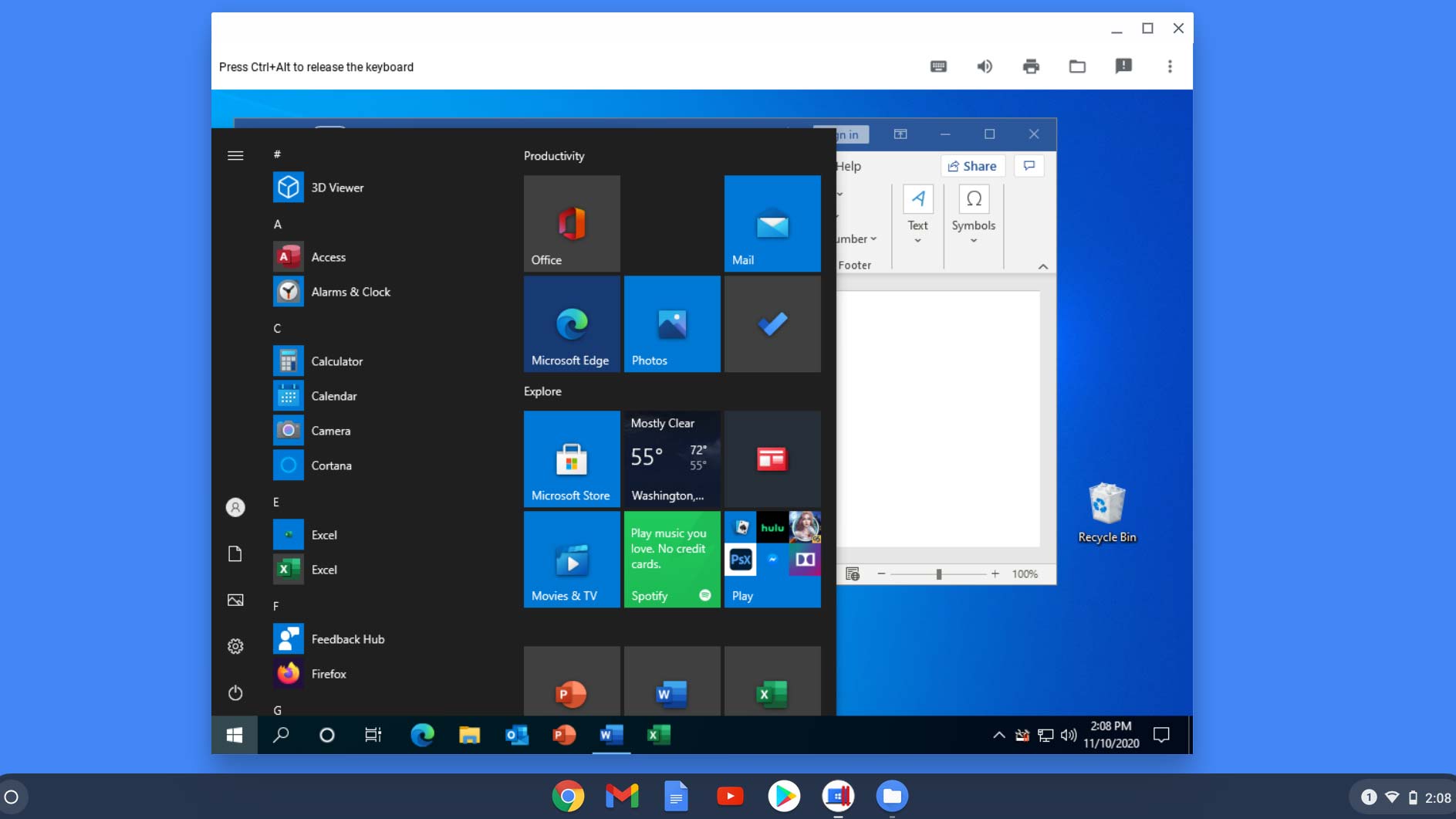
I multitasked between multiple desktop Windows apps such equally Adobe Photoshop, Microsoft Word, Mozilla Firefox, Slack, and more. Since this is designed in partnership with Google itself, Parallels is also deeply integrated with Chrome Bone.
Therefore, your Windows files sync with your Chromebook's default Files app (alongside your Linux and Android folders). You can re-create and paste between Windows and Chrome Os, connect to accessories like printers and wireless keyboards from Parallels without whatever actress setup, and more. You can even choose to open links from Windows ten in your Chromebook'southward congenital-in Chrome browser.
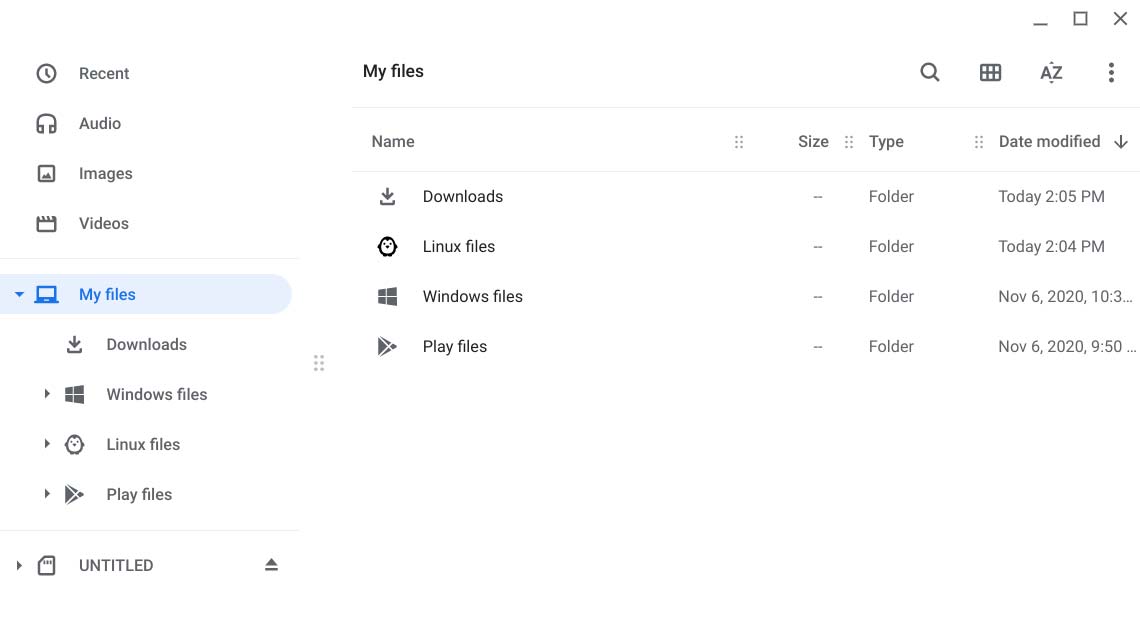
One of the about impressive aspects of Parallels for Chrome Os is how stable it is. When you lot wake up your Chromebook from standby, for case, you don't have to wait for Windows 10 in Parallels to render. It resumes instantly and your Windows apps remain active in the background -- just as if you're on a Windows PC.
On top of that, I was able to run information technology at full resolution so I often threw the Parallels app to an external monitor to have Windows 10 on 1 screen and Chrome OS on the other. I did run across frame drops when I tried pushing it to the limit with numerous apps and browser tabs, though. That is where, I suppose, the high-end specification requirement truly comes in handy. At that place are likewise no multi-touch on Windows gestures and mic support yet.
CrossOver for non-enterprise Chromebook users
CrossOver, on the other hand, is more complex and has a far less seamless experience. Since it didn't have Google'due south backing, information technology takes advantage of your Chromebook's Linux container. So you're essentially channeling resources through a full of three operating systems to run a Windows app. In that location'southward a lot of room for fault and that became credible when I started using it. Furthermore, CrossOver works on an app-by-app basis instead of simply firing upwardly Windows x in a window and you have to jump through a few hoops to install an app.
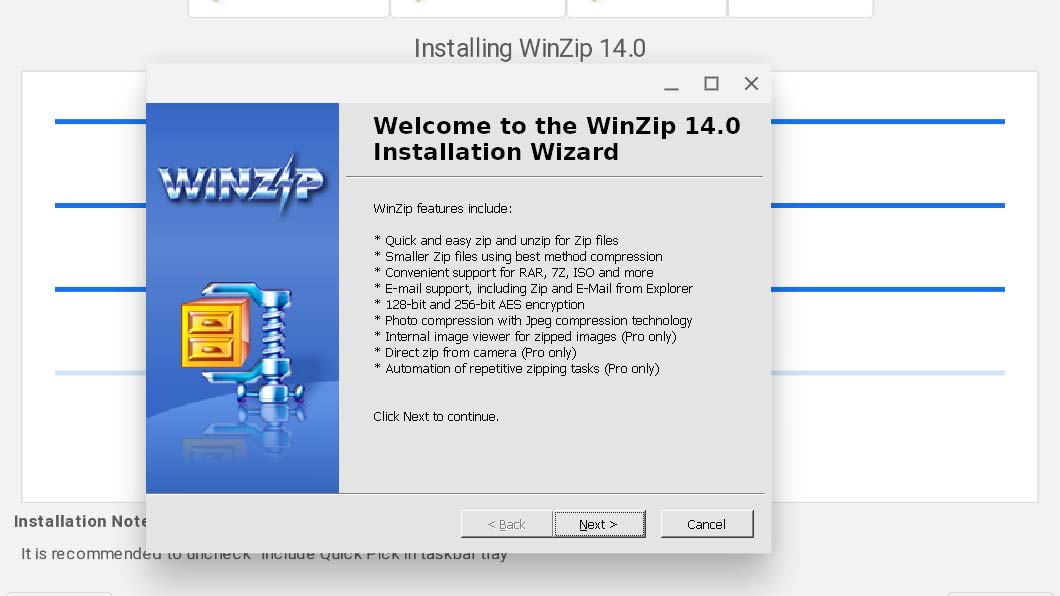
The concept is straightforward: you lot download an .EXE file or pick from CrossOver's catalog of canonical Windows apps and install them usually on your Chromebook. In reality, though, I couldn't become it to process a whole lot of modernistic apps and often had to settle for an outdated version.
Despite a few shortcomings, CrossOver is good enough in one case you figure it out. Yous just have to temper your expectations to just occasionally access the essential agglomeration of Windows software, such as Microsoft Part.
Another perk of having Windows apps on a Chromebook is superior offline support. While services like Google Docs are fine without the internet, non every website is optimized for offline access on Chrome Os, and Linux apps generally are too clunky to be usable. Thankfully, Parallels provides, the expert-ol' condolement of saving and opening files locally, which comes in handy when you're traveling.
Does Chrome Os need Windows, Linux, and Android apps?
My Chromebook'southward desktop, as I type this in Microsoft Word, is different the ambitious cloud OS Google launched over a decade ago. At times, in the last few days, I have found myself working on apps congenital for iv different operating systems: the Chrome browser, Linux final for programming side projects, the YouTube Music Android app, and a range of Windows programs.
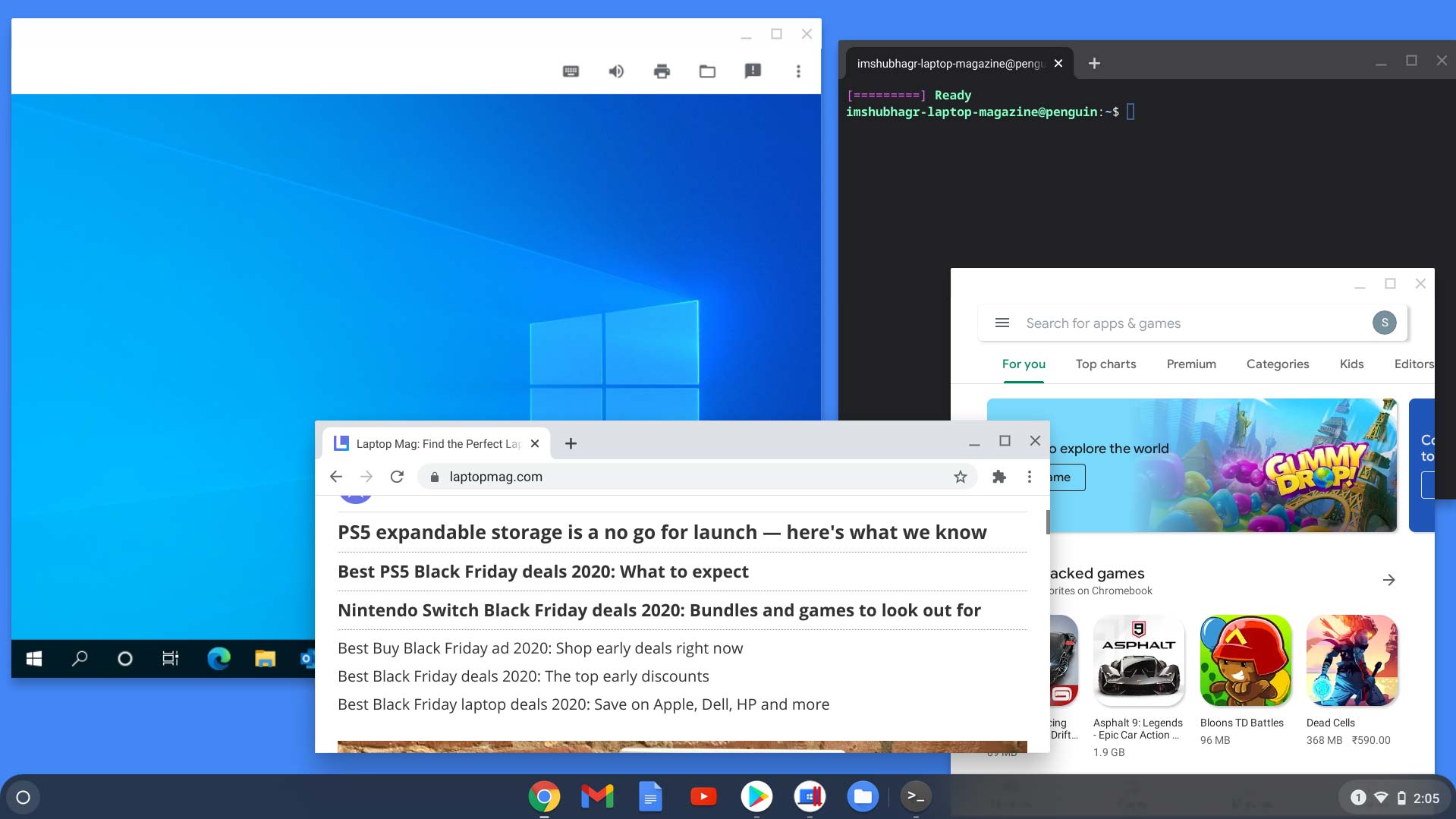
Google wanted Chrome Os to be nothing like what was on the marketplace. Lately, though, it has started to feel information technology's trying to become all of them -- at once.
And while information technology'south easy to label these developments as messy and defective a articulate strategy, information technology's important to notation that Google has not taken down the boundaries that separate these virtual environments. Today, if yous boot a Chrome Bone notebook for the first fourth dimension, information technology's largely identical to some of the outset systems that launched years ago. But now yous take Android, Linux, and Windows apps available for when you need them, else they won't come in your way to surf the web.
Information technology's increasingly apparent to me that Google is desperately looking to aggrandize Chromebooks beyond schools and the cloud-simply user niche. Android enables Chrome Bone tablets, Linux for developers (Google has also released Android Studio for Chromebooks), and Windows for businesses.
Affordable PCs have caught upwards too, and Chromebooks, at least the sub-$500 models, don't have the cost upper-hand anymore either. With these updates, Google is patching the holes, similar the absenteeism of desktop-grade tools, which accept held Chrome OS back from entering the mainstream.
Chrome OS is a improve and more than capable computer Os than information technology e'er was. No longer practice I have to achieve out to my backup Mac to use a specific desktop programme. Yous don't have to be someone who lives on the web to take advantage of Chromebooks. Only it helps as Chrome OS is still the most productive and efficient through the Chrome browser. Before, it was possible for about people to practice ninety% of their calculating tasks on a Chromebook and now, that remaining 10% is shrinking too.
Are you but better off with a budget PC?
Loftier-terminate Chromebooks, similar the Asus Chromebook Flip C434, that price around $500 will yet offer you a more than reliable, versatile, and longer-lasting computing experience for the cost. Merely if y'all're someone who spends most of their computer time on traditional desktop software, you're probable better off with a budget PC.
Source: https://www.laptopmag.com/news/i-turned-my-chromebook-into-a-windows-machine
Posted by: scrogginslithad.blogspot.com


0 Response to "I turned my Chromebook into a Windows machine — and so can you | Laptop Mag"
Post a Comment